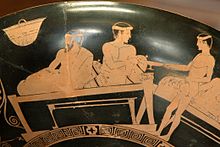Cup-bearer
![]()
This article or subsequent section is not sufficiently supported by evidence (e.g., anecdotal evidence). Information without sufficient evidence may be removed in the near future. Please help Wikipedia by researching the information and adding good supporting evidence.
The cupbearer, also butigler or later Hofschenk (Latin pincerna or buticularius, probably derived from Pütker, as the court office was called in the principality of Lüneburg - see also Cellarius or Kellerer, Latin cellarius) was a court servant in the Middle Ages who was responsible for the supply of beverages - especially wine - and since Carolingian times also for the administration of the royal vineyards. At larger princely courts the function of the cupbearer developed into a court office, which as an honorary office often became hereditary in a high-ranking noble family, but in fact was usually exercised by a deputy.
First mentions of the office of cupbearer are already in the Bible in Genesis 40,1-23 EU, where the cupbearer of Pharaoh is mentioned, as well as in Neh 1,11 EU/Neh 2,1 EU and 1 Kings 10,5 Lut. Nehemiah himself was cupbearer to the Persian king Artaxerxes Longimanus, the son of Xerxes I at Susa. The office is also attested from the Assyrian court (about Aššur-bunaja-usur under Salmanasser III). There the cupbearer was a high official who could, for example, hold the office of eponymous official.
The office of cupbearer was an office with a very high responsibility, but also a position of trust. Similar to the office of the taster, which was already known in antiquity, the ruler entrusted his health and well-being to the cupbearer. Furthermore, the cupbearer had direct access to the king when he was in a good mood and available for favours. This position of trust led to the high reputation of the office until the High Middle Ages.
In the Holy Roman Empire of the German Nation, the office of cupbearer was one of the four arch offices associated with the secular electorship. Thus, the King of Bohemia was the Archmundschenk of the Roman-German Emperor. All these, however, were mere titles of honour. The actual duties connected with the offices were performed on behalf of the electors by the holders of the so-called imperial offices. For example, during the festivities for the coronation of the Roman-German Emperor in Frankfurt am Main, the Reichserbschenk (pincerna imperii) was responsible, among other things, for serving wine to the people free of charge.

Cupbearers (right) in antiquity were often slaves - here, for example, in ancient Greece (460-450 BC).
See also
- Schenk
Questions and Answers
Q: What is a cupbearer?
A: A cupbearer is someone who fills cups and serves wine.
Q: What was the role of a cupbearer in a medieval court?
A: In a medieval court, the cupbearer would bring the lord's ale or wine and taste it to ensure that it was not poisoned.
Q: Who typically held the position of cupbearer in a medieval court?
A: The cupbearer was often a person of high rank.
Q: Was being a cupbearer considered an honorable position in medieval times?
A: Yes, being a cupbearer to a king was a distinct honor.
Q: Who was Nehemiah in relation to the cupbearer role?
A: In the Bible, Nehemiah was cupbearer to Artaxerxes I of Persia.
Q: What additional responsibilities did a cupbearer have besides filling cups and serving wine?
A: In medieval times, cupbearers were also responsible for tasting the wine or ale to ensure it was not poisoned.
Q: What was the purpose of the cupbearer tasting the wine or ale?
A: The purpose of the cupbearer tasting the wine or ale was to ensure that it was safe for consumption and not poisoned.
Search within the encyclopedia